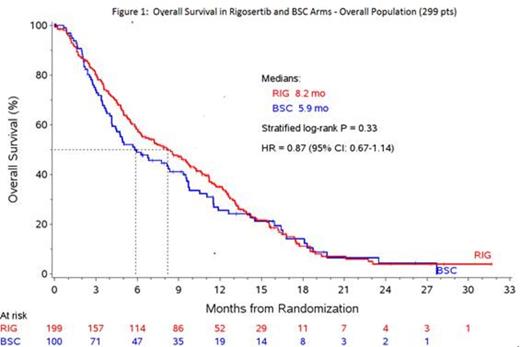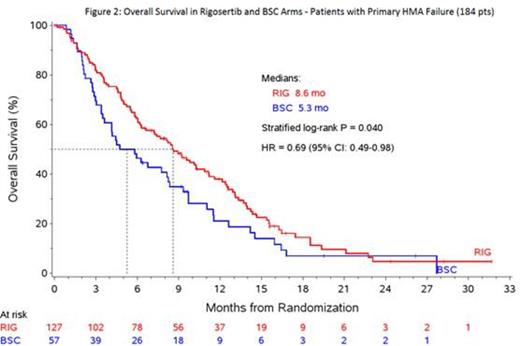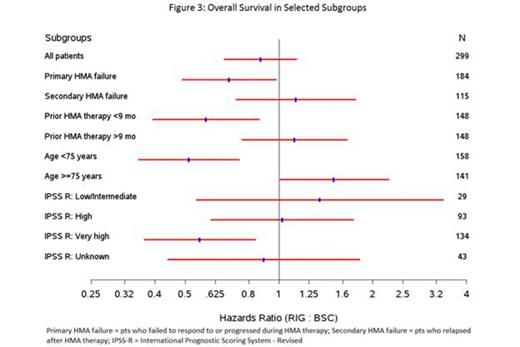Abstract

Background: No approved treatment options are available to HR-MDS pts after HMA therapy. Study 04-21 (“ONTIME” trial) was a Phase III, randomized, controlled study of the efficacy and safety of rigosertib, a novel small molecule inhibitor of PI3-kinase and PLK pathways, in a heterogeneous population of MDS pts who had relapsed after, failed to respond to, or progressed during administration of HMAs. The study was conducted at 87 sites in the United States and 5 European countries.
Methods:From Dec 2010 to Aug 2013, 299 HR-MDS pts [<30% bone marrow blasts (BMBL)] who had progressed on (37% of total enrollment), failed to respond to (25%), or relapsed after (38%) HMA treatment were stratified on BMBL count and randomized 2:1 to receive rigosertib (199 pts) or BSC (100 pts). Rigosertib was administered at 1800 mg/24 hr for 72-hr as a continuous intravenous (CIV) ambulatory infusion, every 2 weeks for the first 16 weeks, and then every 4 weeks. The primary endpoint was overall survival (OS), analyzed on an intention-to-treat (ITT) basis using the Kaplan-Meier method stratified on BMBL (5% to 19% vs. 20% to 30%). The trial had a 95% power to detect a 13-wk increase in median OS from 17 wks on BSC, with a 2-sided alpha = 0.05. The following results are based on 242 deaths: 161 in the rigosertib arm and 81 in the BSC arm.
Results: Overall, the 2 arms were balanced in terms of baseline characteristics, with the majority of pts being male (66%), and White (82%). Age ranged from 50-90 yrs in the rigosertib arm and 55-86 years in the BSC arm (median, 74 yrs). The majority of pts (85%) had an Eastern Cooperative Oncology Group (ECOG) score of 0 or 1. The median duration of the last HMA therapy was 8.8 months (mo) in the rigosertib arm and 10.3 mo in the BSC arm; 127 (64%) of rigosertib pts and 57% of BSC pts were classified as “primary HMA failure” (ie, they failed to respond to or progressed during HMA therapy, as defined by Prebet et al, J Clin Oncol, 2011).
A 2.3-mo improvement in median OS was found in the overall (ITT) population (8.2 mo rigosertib vs. 5.9 mo BSC) (Figure 1). The ITT survival for rigosertib was similar to that noted in Phase I/II studies (35 weeks). The stratified log-rank p-value was 0.33. The stratified hazard ratio was 0.87, which was quite different from the ratio of medians (5.9/8.2 = 0.72), due to the fact that the 2 survival curves converged at 15 mo.
Notably, among the 184 patients with primary HMA failure, the median OS was 8.6 mo in the rigosertib arm (N = 127) vs. 5.3 mo in the BSC arm (N = 57), HR= 0.69, p= 0.040 (Figure 2).
Multivariate Cox regression, adjusting for pretreatment prognostic factors, showed little change in the treatment effect. The following subgroups were correlated with better OS: pts with failure of/progression on HMA treatment, pts with duration of HMA treatment ≤ 9 mo, pts < 75 years of age, and pts with very high risk per IPSS-R (Figure 3).
Rigosertib was well tolerated, with a median dose intensity of 92%. There were no significant compliance or operations issues related to ambulatory continuous infusion. Protocol-defined dose reductions were reported in 5% of pts, with 24% experiencing dose delays of >7 days, mostly due to unrelated adverse events (AEs). No obvious differences between rigosertib and BSC were found in the incidence of AEs (rigosertib, 99%; BSC, 85%) or of ≥ Grade 3 AEs (rigosertib, 79%; BSC, 68%). In the rigosertib arm, AEs reported by ≥ 20% of pts, irrespective of severity or causality, were nausea (35%), diarrhea (33%), constipation (31%), fatigue (30%), fever (27%), anemia (22%), and peripheral edema (21%). Rigosertib had low myelotoxicity, consistent with previous clinical experience.
Conclusions:Although the primary endpoint in this Phase III study of rigosertib vs BSC in pts with HR-MDS did not reach statistical significance in the ITT population, encouraging rigosertib treatment-related improvement in OS was noted in several subgroups of MDS pts, including those with “primary HMA failure and in patients in the IPSS-R Very High Risk category. CIV therapy with rigosertib had a favorable safety profile in this orphan population of elderly pts with MDS.
Fenaux:Celgene: Research Funding; Janssen: Research Funding; Novartis: Research Funding. Sekeres:Celgene Corp.: Membership on an entity's Board of Directors or advisory committees; Amgen: Membership on an entity's Board of Directors or advisory committees; Boehringer Ingelheim: Membership on an entity's Board of Directors or advisory committees. Roboz:Novartis: Consultancy; Agios: Consultancy; Celgene: Consultancy; Glaxo SmithKline: Consultancy; Astra Zeneca: Consultancy; Sunesis: Consultancy; Teva Oncology: Consultancy; Astex: Consultancy. Wilhelm:Onconova Therapeutics, Inc: Employment, Equity Ownership. Wilhelm:Onconova Therapeutics, Inc: Employment. Azarnia:Onconova Therapeutics, Inc: Employment. Maniar:Onconova Therapeutics, Inc: Employment.
Author notes
Asterisk with author names denotes non-ASH members.

This icon denotes a clinically relevant abstract




This feature is available to Subscribers Only
Sign In or Create an Account Close Modal